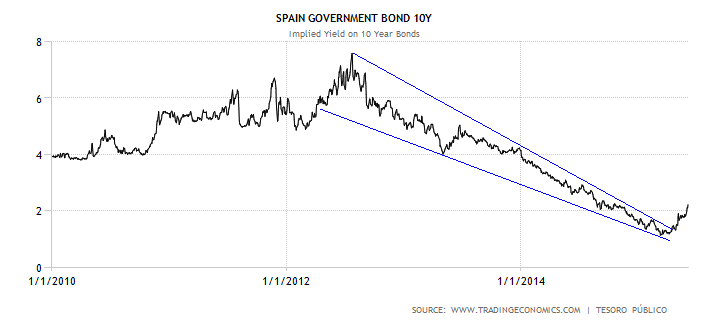"...But no episode is more notable than what happened in the US in 1937, smack in the middle of the Great Depression. This is the only time in US history which is analogous to what the Fed will attempt to do, and not only because short rates collapsed to zero between 1929-36 but because the Fed’s balance sheet jumped from 5% to 20% of GDP to offset the Great Depression.
Just like now.
the impact of higher Fed rates will be far less predictable than normal, that historical comparisons may be less powerful, and that volatility across both credit & equity markets should continue to be owned.
Actually, the main reason is one, and it is very simple. It is shown in the chart below.
Here are some other reasons why the Fed's rate hike will lead to a period of, to put it mildly, volatility...
- Central banks now own over $22 trillion of financial assets, a figure that exceeds the annual GDP of US & Japan
- Central banks have cut interest rates 577 times since Lehman, a rate cut once every three 3 trading days
- Central bank financial repression created $6 trillion of negatively-yielding global government bonds earlier this year
- 45% of all government bonds in the world currently yield <1% (that’s $17.4 trillion of bond issues outstanding)
- US corporate high grade bond issuance as a % of GDP has doubled to almost 30% since the introduction of ZIRP
- US small cap 5-year rolling returns hit 30-year highs (28%) in recent quarters
- The US equity bull market is now in the 3rd longest ever
- 83% of global equity markets are currently supported by zero rate policies
...the manager of the world's biggest hedge fund...This is what Ray Dalio says ahead of the upcoming rate hike:
... in our opinion, inadequate attention is being paid to the risks of a downturn in which central bankers' abilities to ease are significantly impaired. Please understand that we are not sure of anything but, for the reasons explained, we do not want to have any concentrated bets, especially at this time.
Source:
1937 Redux
















 Most commentary on the housing markets — from the
industry, from analysts, from the media — all give the impression that the
housing crisis is well behind us.
Most commentary on the housing markets — from the
industry, from analysts, from the media — all give the impression that the
housing crisis is well behind us.






